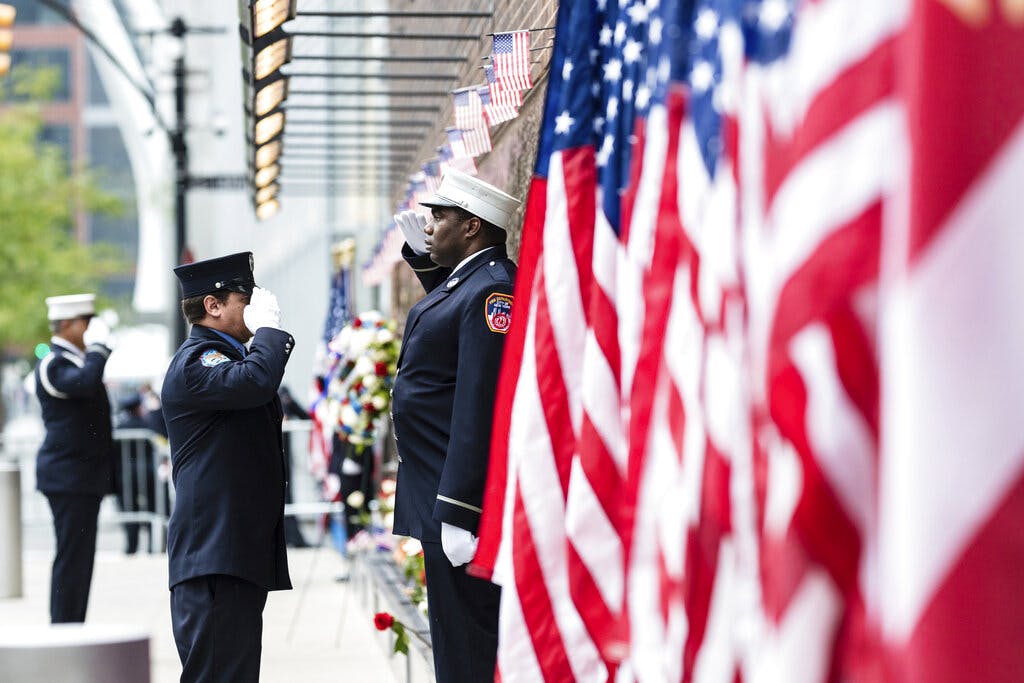How Americans Are Forgetting the Lesson of 9/11
And why we do so at our own peril.

We vowed we’d never forget. Now, just 21 years later, it appears we have entirely forgotten. No, we haven’t forgotten the victims. Their names are etched on the Ground Zero memorial and are being read aloud today in solemn ceremonies across the country.
We haven’t forgotten the heroes. They have been memorialized in books, movies and monuments. We haven’t forgotten the buildings. The Freedom Tower now dominates the Manhattan skyline, a reminder that America prefers to build back bigger and better.
What we have forgotten is the most important lesson of that day — that terror groups are at their most dangerous when they’re allowed to control territory, and, importantly, when they’re able to secure the backing of state actors.
It’s an argument well articulated by Benjamin Netanyahu in “Fighting Terrorism,” a slim volume first issued in 1995. It’s a cause to which the former — and maybe future — premier has dedicated his life since losing his brother Yoni in 1976 at Entebbe.
“Terrorist groups are usually no match for an advanced technological society which can successfully roll back terror without any significant curtailment of civil liberties,” Netanyahu argues in the book.
Yet with the safe haven provided by state support, Mr. Netanyahu says, the groups can plan and train freely, procure more advanced weapons, and establish significant revenue streams, all while evading the reach of law enforcement.
Israel’s own experiences — at Entebbe, facilitated by Uganda’s Idi Amin, and through half a dozen wars fought against Hamas in Gaza and Hezbollah in southern Lebanon — have underscored the significant challenge presented by ceding territory to terrorism.
In the immediate aftermath of the September 11 terror attacks, this threat was so clearly understood by our military and political leaders that we sent ground forces into both Iraq and Afghanistan. The handling of these wars has since become the subject of debate.
The need to eliminate those safe harbors for terror was appreciated at the time. President George W. Bush said, in his first address that day, that America would draw “no distinction between the terrorists who committed these acts and those who harbor them.”
Days later, in an address to Congress and the nation, the president vowed to “pursue nations that provide aid or safe haven to terrorism. Every nation in every region now has a decision to make: Either you are with us, or you are with the terrorists.”
The president also issued a forceful ultimatum to the Taliban, calling for the dismantling of all terror training camps on Afghan land. “The only way to defeat terrorism as a threat to our way of life is to stop it, eliminate it, and destroy it where it grows,” he said.
As the war in Afghanistan wound down, the establishment of a Caliphate by ISIS in vast swathes or northern Iraq and eastern Syria and the subsequent terror wrought across France and other European countries, reminded us again of the clear and present danger presented by relinquishing land to terrorists.
The West moved to push back with Operation Inherent Resolve, launched in 2014. By March 2019, forces supported by the West had liberated some 110,000 square kilometers of land from the Islamic State.
Yet, in the wake of last years’s clumsy and short-sighted withdrawal from Afghanistan, the United States and our allies have allowed the establishment of an incubation environment for terror groups that appears to be far more potent than it was pre-9/11.
As yet, the warnings of our remaining friends in the region have been met by our own deaf ears. This was marked in a recent meeting at the Sun by the head of foreign relations of the National Resistance Front of Afghanistan, Ali Nazary.
“Terrorism today is much stronger than it was in 2001,” he warned. Mr. Nazary pointed to the weakness of internal opposition, and the seizure from the vanquished Afghan army of billions of dollars worth of advanced American military equipment.
He also warned of the ability to sell the narrative of victory against the West to “recruit more people.” Following the American surrender, Mr. Nazary said in an earlier interview with the Sun, “every terrorist group from Boko Haram to Al-Shabaab to Lashkar-e-Taiba in South Asia congratulated the Taliban.”
Many of these groups have now re-established bases in Afghanistan under the Taliban’s umbrella. The extent to which they have been welcomed by the Taliban was underscored last month when the al-Qaeda honcho, Ayman al-Zawahiri, was assassinated.
That strike, by the United States, found him while he was hosted in Kabul at the home of a top aide to senior Taliban leader Sirajuddin Haqqani. “The realities are not being accepted,” Mr. Nazary warned. “They are not looking into the future at how the current threats might cause another catastrophe.”
Mr. Nazary’s NRF has been able to attract no Western support. He described the group to the Sun as being “completely isolated.” American State Department officials have held more meetings with the Taliban in the past year than with the NRF, Mr. Nazary says.
Funds are being raised from private individuals among the Afghan diaspora. Yet they are paltry sums. “Those who went into Afghanistan to fight against terrorism and for democracy all of a sudden abandoned that cause,” Mr. Nazary concludes.
The War on Terror began on this day 21 years ago amid fire and thunder and the steely resolve and collective might of history’s greatest powers. Today the banner is carried by a rag-tag band of under armed, underfunded, and lonely warriors.
They are nestled precariously in the remote mountains of the Hindu Kush. It is to our great shame that we have forgotten the lesson of 9/11 and abandoned wholesale the War on Terror. It is also to our own great peril.

